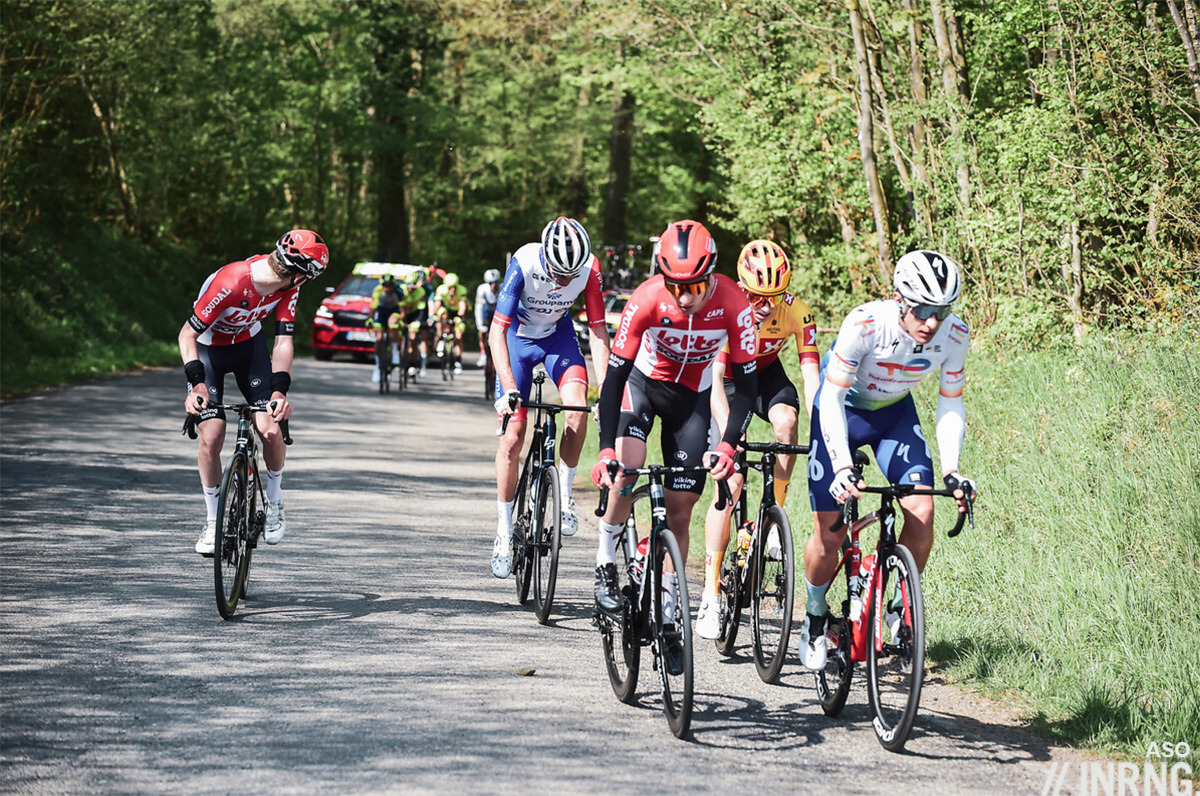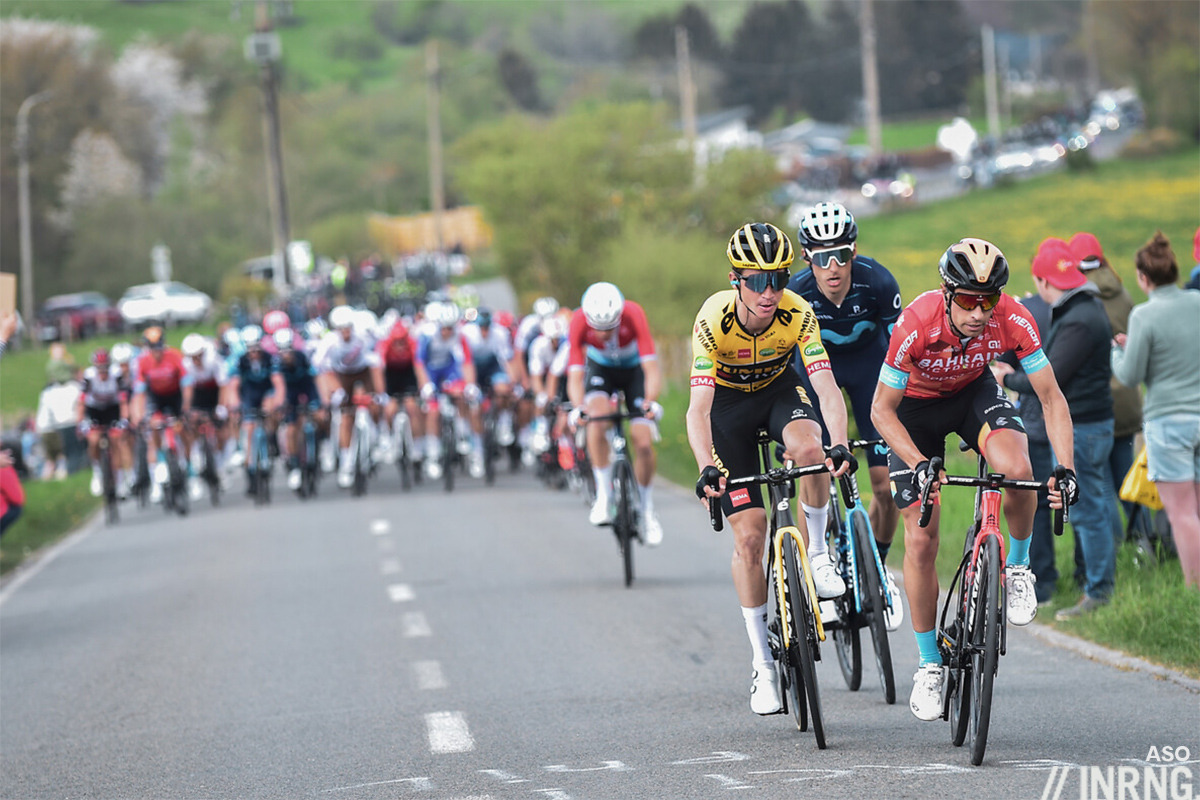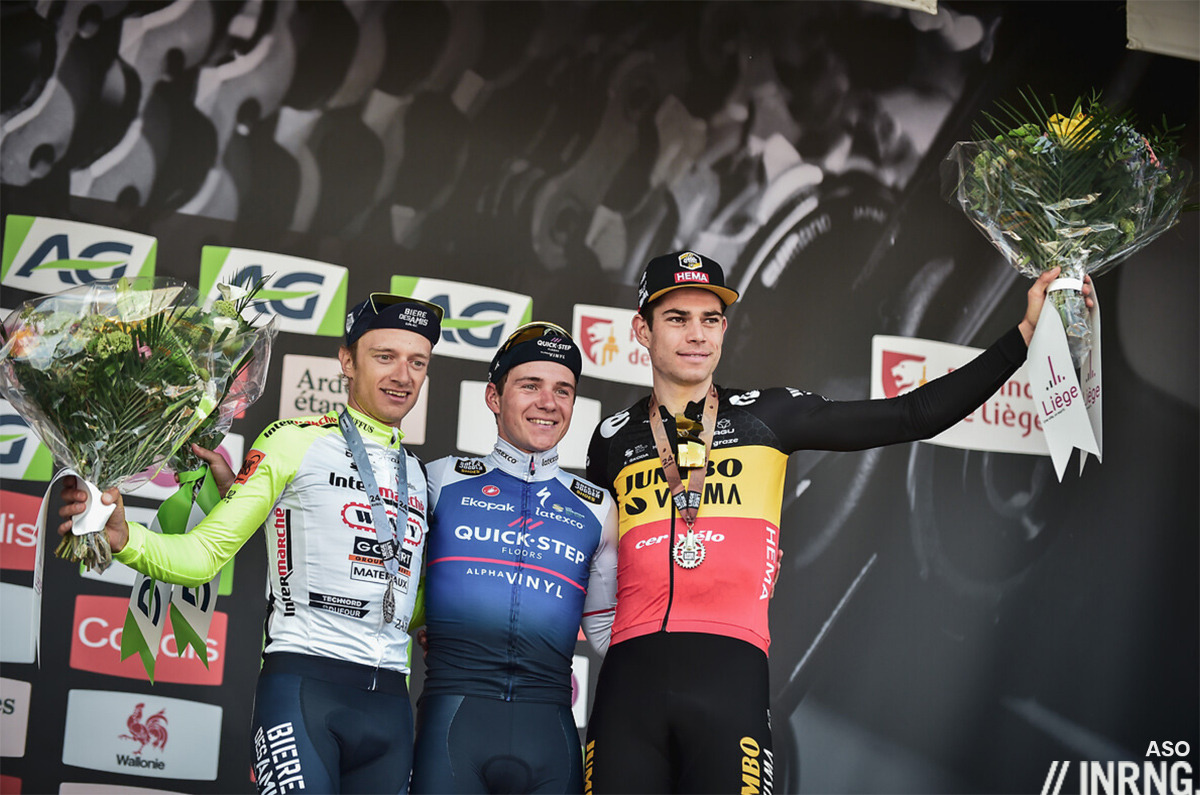The fourth pick of the season and it’s getting difficult to pick because to chose one means to leave others out. So here’s Liège-Bastogne-Liège, a difficult choice but a few extra factors swung it.
They’ve changed the finish of Liège-Bastogne-Liège and it’s helped to improve the race, but only just. It’s still a relatively formulaic race with an early break going, the pace picks up on the return from Bastogne and the succession of climbs sees teams send their lieutenants up the road to soften things up ahead of the inevitable showdown on the Roche-aux-Faucons climb where the distance, intensity and steep slope force a selection. This year it was all different.

Still an early breakaway of 11 riders took six minutes on the trip down to Bastogne. As the road became hillier breakaway on the return, they were down to seven riders and with three minutes once the Wanne-Stockeu-Haute Levée trilogy down.
One big lowlight was the crash on the approach to the Col de Rosier. A wave, a touch of wheels and the peloton was felled at 70km/h with riders flying into the ditch and woodland. As the TV surveyed the damage Julian Alaphilippe and his rainbow jersey couldn’t be seen at first. He was in a ditch, stuck between a rock and a pine tree as Romain Bardet made his way down to help. There was a lull in the racing, a truce.

As things resumed the Bahrain team was active, their rider Dylan Teuns having won Flèche Wallonne. Mikel Landa launched five attacks. None of them was vintage Landa, the bicycling Zorro who slices the peloton to ribbons with his rapier attacks, these were Landa as a meat tenderiser so soften the legs of others.
Onto La Redoute and a tribute to local hero Philippe Gilbert, racing over the PHIL PHIL PHIL for one last time. The breakaway had split to pieces with only Bruno Armirail left from the breakaway over the top. Many of the Ardennes climbs are irregular, get to the top and immediate descent awaiting. La Redoute is a typical example, the climb proper ends with a left turn and the road levels out but the work isn’t quite done as it kicks up again. And this was just where Remco Evenepoel attacked.
He launched with such power that the riders on his wheel just seemed powerless to follow him when this was their one vital job and they all knew it. Quick-Step had lost their co-leader so any Evenepoel move was going to be all-in, Alaphilippe was not sitting tight to launch later on. This was the obvious place for him to attack too, to build up a lead ahead of the Roche-aux-Faucons climb while others hesitate; rather than suffer the darting attacks of the climbers.
Movistar and Bahrain had riders to spare for the chase but they began to waive, as hard as they tried they couldn’t get back time on Evenepoel. They needed to bring the gap back to 20 seconds at the foot of the Roche-aux-Faucons climb so that any jack-in-box attack could spring across the gap. But 35s was too much, arguably only Primož Roglič, Tadej Pogačar and Julian Alaphilippe could close a gap that wide but the first wasn’t racing, the second didn’t start and the third wouldn’t because he’s a team mate even if was still in the race.
Over to the false flat with its horrid concrete section that feels slow no matter what, and Dylan Teuns and Aleksander Vlasov made powerful attacks and after a flurry of moves they were within 16 seconds of Evenepoel. But that was the problem, no closer. They had a wall to scale but had brought a ladder a step too short.
Why the highlight?
A difficult pick, this was a great day’s racing but what made it stand out? It’s subjective but it was a close race, this wasn’t Evenepoel riding away and sucking the suspense out of the finish. Seeing a race that had become formulaic being rescripted must have left La Doyenne smiling.
With hindsight?
It felt like more people warmed to Evenepoel during the Vuelta, his personality is coming across and while he makes it look easy on the bike, he’s able to explain events better after the race. But all this was on display on the local TV coverage in Liège. “Ever since he’s started racing he told me about Liège, Liège, Liège” his girlfriend (now wife) said to RTBF and Evenepoel’s post-race interview was sincere and heartfelt, this was a dream come true rather tha a new line on the palmarès. This was all pre-Vuelta and only question left was whether he could handle three weeks and the high mountains: we got the resounding answer in September.
Alas Alaphilippe’s crash cost him much of the season, if he’d resume racing at the French championships he was still chasing his shadow (and being goaded by his team manager). Yet both these riders signal Quickstep’s shift away from the cobbled classics, they still have a formidable team but increasingly their ambitions are turning to grand tours and it’ll be interesting to watch this cultural shift.
Quinten Hermans making the podium was a result few would have predicted but it said plenty about Intermarché-Wanty-Gobert’s season, they started 2022 as relegation candidates only to finish the year as Belgium’s best team, at least on the UCI rankings.

Highlights of 2022 – Part I
Highlights of 2022 – Part II
Highlights of 2022 – Part III

I can’t exactly say it was a highlight, because no-one wanted to see Alaphilippe having another big crash, but seeing Bardet abandon his own race to go & check on his countryman I thought was one of the most moving moments of the season.
He rightly got a lot of credit for this, and even a “fair play” award as well.
5th paragraph – typo: “wa” isntead of “was”
Fixed for the next reader, thanks
tha for than in the first paragraph of “with hindsight”
eh, I felt LBL was a dozen guys looking at WVA to do something and everybody letting Remco go. Whether they could have held them either way isn’t known, but I though it made for a boring conclusion.
People watching for a WVA attack or closing move on the Redoute were clearly looking into a possible future or a parallel universe of sort, because he sure couldn’t attack alone on these climbs this year (or he’d go with Remco himself, among other things – not teammates here). And the peloton was quite much pulling, behind, besides the various flurries of attacks trying to get back to the lone r(a)ider ahead which happened later. Inrng’s report above looks closer to what happened on the road. People were really looking and waiting also in San Sebastián, after this? And at th Worlds? I’d even say that after Colbrelli’s EC, many know that if they can keep Remco’s wheel, they might well “steal” the race, so it’s well worth trying (ask Powless or Lutsenko). And yet…
Not disagreeing but I’m not sure that makes it a highlight of the year.
LBL was big especially because so many editions had shown how difficult it was nowadays to act decisively on the Redoute. And suddenly, shades of Bartoli. But personally if I had to choose one among Remco’s one-day 2022 masterpieces, I’d have picked the Worlds… although they were probably “easier” for him, he hadn’t to beat WVA as a clear rival, and the conclusion albeit far from boring had the gold decided from far out. Yet, well, that was a hell of a race, with significant early action, too, and lots of moves, strategies, decisions etc. Hard to choose, really.
I just don’t see LBL coming close to the excitement of Flanders, or even PR or MSR. I feel like this highlight was more of an award for Remco finally coming good this season – a year long highlight.
Re: your last comment below, I’d sure agree that LBL started to slowly climb out from a decade of crisis just in the last 2-3 editions, wheras PR despite the odd duller edition here and there (2022, 2017, 2015, 2011…), and even more so the Ronde, are enjoying good health, while at the same time even Sanremo had a lot of thrilling finales recently and Lombardia looks more international and hard contested than ever.
That said, Monuments live in a longer “durée” and we simply can’t ignore the fact that not long ago, say 1997 to 2007, Liège was the clear and legitimate Queen among the Monuments for average technical value.
Sanremo was highly formulaic (as or worse than LBL in the 10s), Flanders struggled because of a certain lack of very top level competitors after Bartoli/Museeuw and before Boonen (with all due respects for the very good riders who were winning, may of whom among my favourites… but precisely because they could win out of intelligence without being absolute monsters, say Tchmil, Van Petegem, Tafi), PR tended to have a totally random winner out of every 3 editions which is a bit too much even for PR, while finally Lombardia was mainly an Italian affair, albeit with high-quality winners.
LBL stayed good for some other 4-5 years, think Schleck, Niba-…Iglinsky, Gilbert (!!!) editions, but the impact of conservative riding and Valverdism hit hard and “blocked” the race while the other Monuments thrived each for different reasons.
Yet, in 2011 to me it was once more the best Monument, for example, although briefly.
So, we just can’t say if this last LBL is a random gem or rather a step in a possible process of new and favourable evolution which could already be seen in the very last editions, hence pre-judging a race only because of its recent history doesn’t look right to me. I surely preferred 2022 LBL to most other Monuments barring perhaps Flanders, and not because the other were that bad.